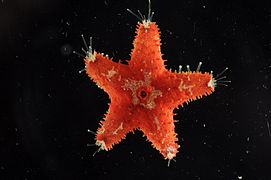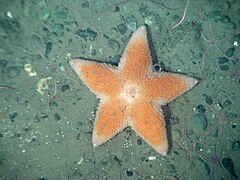Pterasteridae
Appearance
| Pterasteridae Temporal range:
| |
|---|---|

| |
| Pteraster capensis | |
| Scientific classification | |
| Kingdom: | |
| Phylum: | |
| Class: | |
| Order: | |
| Family: | Pterasteridae Perrier, 1875
|
| Genera | |
|
See text[1] | |
Pterasteridae is a family of sea stars in the order Velatida, consisting of eight genera.
Description and characteristics
Pterasterids are primarily deep-water, and have an inflated aboral surface. Like many other members of the ordo Velatida, they have a hole in the middle of the central disc called "osculum", from which they can expel mucus for defending against predators.[2]
Many species brood their young in an internal chamber flushed with seawater.
Fossil pterasterids have been found as early as the upper Campanian of the Cretaceous period.[3]
Genera
According to the World Register of Marine Species :
- Amembranaster Golotsvan, 1998 -- 1 species
- Benthaster Sladen, 1882 -- 3 species
- Calyptraster Sladen, 1882 -- 5 species
- Diplopteraster Verrill, 1880 -- 7 species
- Euretaster Fisher, 1940 -- 3 species
- Hymenaster Thomson, 1873 -- 51 species
- Hymenasterides Fisher, 1911 -- 2 species
- Pteraster Müller & Troschel, 1842 -- 46 species
-
Hymenaster echinulatus (both faces)
-
Hymenaster sp.
-
Pteraster stellifer (both faces)
-
Pteraster sp.
See also
Wikimedia Commons has media related to Pterasteridae.
Wikispecies has information related to Pterasteridae.
External links
- Mah, Christopher L. "Pteraster & kin- Starfish that fight back with mucus!". Echinoblog.
References
- ^ Mah, C.L. "Pterasteridae Perrier, 1875". World Asteroidea Database. Retrieved 27 March 2014.
- ^ Mah, Christopher L. "Pteraster & kin- Starfish that fight back with mucus!". Echinoblog.
- ^ Villier, Loïc; Blake, Daniel B.; Jagt, John W. M.; Kutscher, Manfred (2004). "A preliminary phylogeny of the Pterasteridae (Echinodermata, Asteroidea) and the first fossil record: Late Cretaceous of Germany and Belgium". Paläontologische Zeitschrift. 78 (2): 281–299. doi:10.1007/BF03009226.





